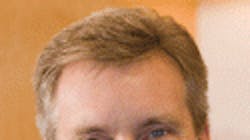Bayer's Prescription: More Innovation, Less Administration
No science-based company can afford to take a relaxed approach to innovation and product development. For Bayer, which has the motto "Science for a Better Life," marching orders came last November to put even more emphasis on growth and innovation.
Board Chairman Marijn Dekkers announced that the company would cut 4,500 positions, including 1,700 in Germany, in order to finance investments in new pharmaceutical products, its BioScience business and expansion in emerging markets such as Asia. Bayer also will create some 2,500 new jobs, mostly in those emerging markets, by 2012.
Greg Babe, president and CEO of Bayer Corp., has already been through a similar process in North America, where he runs the MaterialScience business and has overall holding company responsibility. In 2007-8, the company cut 15% of the MaterialScience workforce.
He said what enabled his workforce to "get through that was that we immediately switched into growth mode." With a mantra of "simplify, standardize and automate," the company invested in automation for back office functions and put renewed emphasis on product development, marketing and sales.
While the Bayer Group saw sales increase 16.1% for the first three quarters of 2010 and saw EBITDA before special times climb 10.5%, Babe says the highlight of the year "has been the recovery of our material science business." That business has been up 35% in North America and is seeing significant growth in the developing world.
"We are investing very heavily in China," said Babe, noting that the MaterialScience business will invest 600 to 700 million euros annually over the next five years in Asia Pacific and in developed regions.
Babe said much of MaterialScience's recovery was tied to growth in the automotive and business machine markets. While construction is still down, he said there have been improved sales for the refurbishment of buildings, a result of efforts to improve energy efficiency.
"We will see an uptick in residential contruction," Babe predicts. "We have to. At 500,000 unit starts per year, that is a third to a half of what we really need to do just to meet the demographic growth in the U.S."
In terms of its U.S. employees, Babe said health care reform would not have a significant impact on the company's health care benefit costs, at least for 2011. He said a new national wellness program for employees, which went through a two-year pilot program, should help to offset some of the costs.
As a longtime manufacturing executive, Babe is a proponent of a national manufacturing policy for the United States. He said the country needs a "full, holistic policy on manufacturing that then can serve as the roadmap for what you do legislatively and from a regulatory perspective."
He said the government needs to address the high corporate tax rate, implement financial reform in a way that promotes lending, invest in transportation and infrastructure, and promote science and engineering education.
Greg Babe will be addressing these and other challenges facing U.S. manufacturing in his keynote address to IndustryWeek's Best Plants Conference, April 4-6, in Atlanta.
See Also:
• Dow Corning's Experience with B2B Commerce Pays Off
About the Author
Steve Minter
Steve Minter, Executive Editor
Focus: Leadership, Global Economy, Energy
Call: 216-931-9281
Follow on Twitter: @SgMinterIW
An award-winning editor, Executive Editor Steve Minter covers leadership, global economic and trade issues and energy, tackling subject matter ranging from CEO profiles and leadership theories to economic trends and energy policy. As well, he supervises content development for editorial products including the magazine, IndustryWeek.com, research and information products, and conferences.
Before joining the IW staff, Steve was publisher and editorial director of Penton Media’s EHS Today, where he was instrumental in the development of the Champions of Safety and America’s Safest Companies recognition programs.
Steve received his B.A. in English from Oberlin College. He is married and has two adult children.
